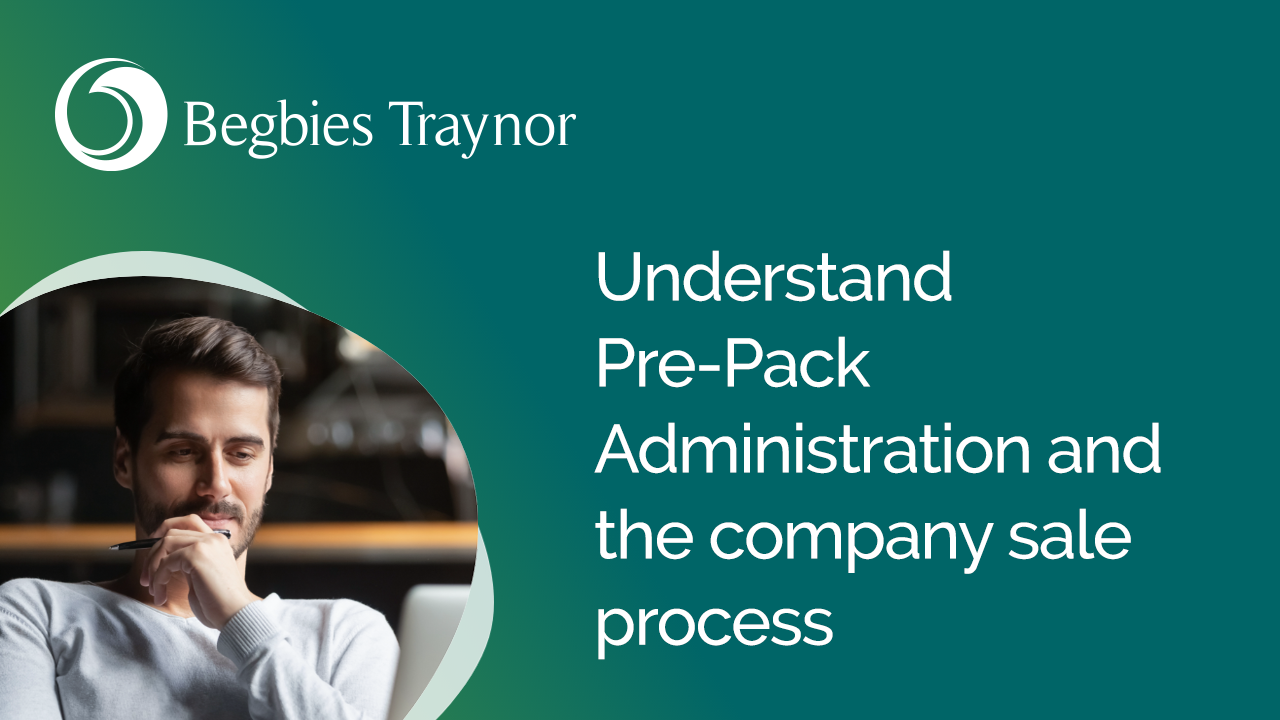Pre Pack Administration
What is Pre-Pack Administration?
Pre pack administration is a special type of company administration process, whereby the sale of a business is agreed prior to the administrator being formally appointed.
Although administration and pre-pack administration are governed by the same best practice requirements, the pre-pack process differs in one key area – the sale of the business and any assets of the company is negotiated before the appointment of administrators and completes either immediately upon the appointment being confirmed. This differs from the standard administration process where part of the administrator's role is to market the business for sale or consider alternative options if a sale is not viable.

Advantages of pre pack administration
A pre pack administration allows for the sale of a business as a ‘going concern’ without impacting on the continuity of business operations upon appointment of an administrator. This helps preserve the value of the company and its assets (particularly ‘work in progress’) as well as ensuring continuity for employees during the sale process. The image and business ‘brand’ is unlikely to be compromised by adverse publicity, leading to the increased likelihood of jobs being saved and suppliers being paid under the new ownership.
As company value is preserved by completing a sale prior to entering into administration, this helps to minimise losses to creditors. A fundamental part of administration - whether pre pack or standard - is to acheive the best returns to creditors as possible. In fact, a company is not able to enter into any form of administration unless the administrator can acheive one of the three statutory purposes of administration which are:
- Rescuing the company as a going concern
- Achieving a better result for creditors than would be possible if the company were wound up without first being in administration
- Realising property to make a distribution to one or more secured or preferential creditors
Who can buy a business through the pre pack administration process?
The appointed insolvency practitioner is in a position to choose the most appropriate buyer for the business assets, whether that is a third party wishing to use the assets in an existing business, or the director(s) of the insolvent company who are operating through a new company.

Find Your Begbies Traynor Group Professional
Use our People Search to find the person you need based on location or skillset.
The steps involved in a pre-pack administration
1. A company is under pressure from creditors and is threatened with receivership or liquidation.
2. A firm of licensed insolvency practitioners is contacted to discuss the situation. They perform a business assessment and provide a range of possible options.
3. If pre-pack administration is decided upon, the insolvency practitioner values the company's assets and prepares a Statement of Affairs.
4. If business assets are to be sold to an existing company, steps will be taken to ensure the buyer has the necessary funds. This includes the provision of management accounts and other information to the insolvency practitioner.
5. If the intention is to sell the assets to a new company, or ‘newco,’ cash flow, profit and loss, and balance sheet forecasts should be provided to demonstrate the viability of the new company, and their ability to purchase the assets. Assistance to buy in the form of asset-based lending may be available.
6. The company is placed into administration, suspending all legal actions against them, and assets are sold immediately.
7. The administrator organises a creditors’ meeting during which an explanation and justification for going down the route of pre pack administration is provided.
8. The IP repays creditors pro-rata, with funds received from the liquidated assets.
Advice on Rescue Options
Arrange a free consultation with an insolvency professional at Begbies Traynor – choose a time at your convenience and with no obligation.
Free ConsultationA word about insolvency regulations
The Enterprise Act, 2002, made it legal for an administrator to be appointed without reference to the courts. The administrator needs to be a licensed insolvency practitioner, bound by the Statements of Insolvency Practice (SIP).
The ethical nature of pre-pack administrations has often been called into question, and the addition of SIP 16 in 2009 was designed to allay some of these concerns. Issues covered by SIP 16 include:
• The relationship between an IP and the insolvent company’s directors prior to administration – they should make it clear that they are acting in the interests of the company rather than the directors.
• A full history of the decision-making process, and why pre-pack administration was chosen over other alternatives.
• Reassurances that the administrator worked in the best interests of the creditors.
• Disclosure of the identity of the buyer, and any connection with the insolvent company or its shareholders.
Transparency is paramount during a pre-pack administration. At Begbies Traynor we understand the issues and complexities, and are able to help companies negotiate the minefield of perceived ethical issues inherent in this process.
When might pre-pack administration be a good option?
Pre-pack administration is not going to be the best option in all cases. In fact it may not even be possible depending on the position the company has found itself in. If this is the case, your insolvency practitioner will discuss more appropriate options which may include a Company Voluntary Arrangement, or possibly a Creditors’ Voluntary Liquidation.
The main criteria for a pre-pack administration is that it must be in the best interests of creditors as well as those of the company, and the requirement to show proof of this has been discussed above.
Assets need to be worth enough to pay secured creditors, otherwise they may force the company into receivership. If assets are valued highly enough to repay secured creditors, pre-pack administration could be a good choice. Begbies Traynor can arrange for asset valuation to determine the best route.
A company already insolvent and unable to repay unsecured creditors may find that pre-pack administration is beneficial for them, and can be justified because the unsecured creditors would not be paid under an alternative route.
Further Reading on Pre Pack Administration
Contact Begbies Traynor Group
Our Media Centre
Read our latest news, expert opinion pieces and articles covering the the professional and financial sector.




